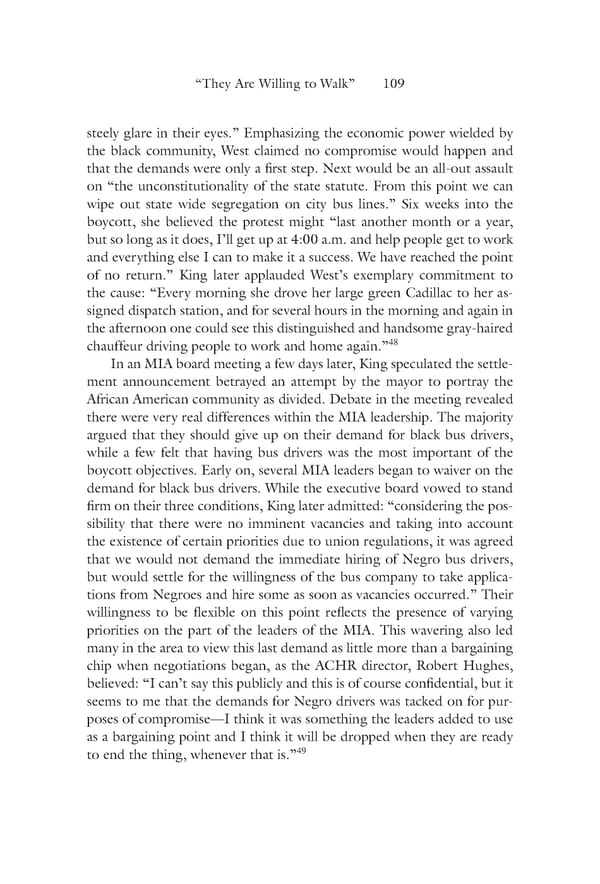“They Are Willing to Walk” 109 steely glare in their eyes.” Emphasizing the economic power wielded by the black community, West claimed no compromise would happen and that the demands were only a first step. Next would be an all-out assault on “the unconstitutionality of the state statute. From this point we can wipe out state wide segregation on city bus lines.” Six weeks into the boycott, she believed the protest might “last another month or a year, but so long as it does, I’ll get up at 4:00 a.m. and help people get to work and everything else I can to make it a success. We have reached the point of no return.” King later applauded West’s exemplary commitment to the cause: “Every morning she drove her large green Cadillac to her as- signed dispatch station, and for several hours in the morning and again in the afternoon one could see this distinguished and handsome gray-haired 48 chauffeur driving people to work and home again.” In an MIA board meeting a few days later, King speculated the settle- ment announcement betrayed an attempt by the mayor to portray the African American community as divided. Debate in the meeting revealed there were very real differences within the MIA leadership. The majority argued that they should give up on their demand for black bus drivers, while a few felt that having bus drivers was the most important of the boycott objectives. Early on, several MIA leaders began to waiver on the demand for black bus drivers. While the executive board vowed to stand firm on their three conditions, King later admitted: “considering the pos- sibility that there were no imminent vacancies and taking into account the existence of certain priorities due to union regulations, it was agreed that we would not demand the immediate hiring of Negro bus drivers, but would settle for the willingness of the bus company to take applica- tions from Negroes and hire some as soon as vacancies occurred.” Their willingness to be flexible on this point reflects the presence of varying priorities on the part of the leaders of the MIA. This wavering also led many in the area to view this last demand as little more than a bargaining chip when negotiations began, as the ACHR director, Robert Hughes, believed: “I can’t say this publicly and this is of course confidential, but it seems to me that the demands for Negro drivers was tacked on for pur- poses of compromise—I think it was something the leaders added to use as a bargaining point and I think it will be dropped when they are ready 49 to end the thing, whenever that is.”
 Becoming King: Martin Luther King Jr. Page 129 Page 131
Becoming King: Martin Luther King Jr. Page 129 Page 131